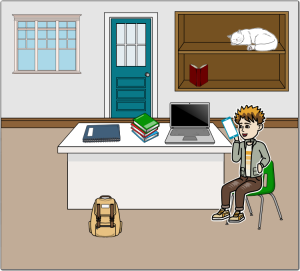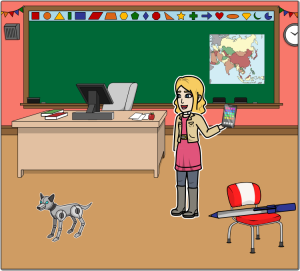12 Section 1-12: Possessive Adjectives
1-12: Possessive Adjectives
You already know how to use ein/eine and kein/keine. Possessive adjectives work the same way. In order to use them, you will need to know the grammatical gender of the word and add the correct ending (if necessary).
Review:
- der Computer→masculine→ein Computer (no ending added)
- das Poster→neuter→ein Poster (no ending added)
- die Wand→feminine→eine Wand (-e added)
We do the same with possessive adjectives.
|
Singular |
Plural |
|
mein/meine—my |
unser/unsere—our |
|
dein/deine—your (informal) |
euer/eure—y’alls (you guys’) |
|
sein/seine—his sein/seine—its ihr/ihre—her |
ihr/ihre—their Ihr/Ihre—your (polite) |
For example, if you want to say „our uncle,“ you will do as follows.
- der Onkel
- masculine; add no ending to “unser.”
- unser Onkel
If you want to say “my sister”…
- die Schwester
- feminine; add –e.
- meine Schwester
If you want to say “your child”…
- das Kind
- neuter; add no ending
- dein Kind
Andere Beispiele:
- Feminine: Meine Mutter kommt aus Alabama.
- Masculine: Mein Vater kommt aus Tennessee.
- Feminine: Deine Tasche ist neu.
- Masculine: Dein Rucksack ist alt.
- Masculine: Ihr Stuhl ist zu klein.
- Feminine: Ihre Tante ist sehr liberal.
- Masculine: Sein Laptop ist aus China.
- Feminine: Seine Tür ist bunt.
- Feminine: Unsere Professorin ist exzentrisch.
- Neuter: Unser Fenster ist grau.
- Feminine: Eure Schwester bleibt gern zu Hause.
- Masculine: Euer Bruder spielt gern Videospiele.
- Masculine: Frau Koch, was sagt Ihr Mann?
- Feminine: Frau Koch, singt Ihre Tochter heute?
- Masculine: Ihr Onkel schwimmt sehr schnell.
- Feminine: Ihre Großmutter ist krank.
Watch Anja’s video to watch her reteaching possessive adjectives with lots of examples using family member vocabulary.
Click here to watch me reteaching this.

Watch Easy German’s video to see more examples. I suggest watching only the first 6 minutes because the video goes into some endings that we won’t learn until Chapter 2.
Mein/meine & dein/deine–my and your (informal)
Ex. B: Stimmt das? Ask your classmates about their family members. Answers should be in complete sentences.
Beispiel: Ist dein Vater kritisch?
→Ja, mein Vater ist kritisch.
OR
→Nein, mein Vater ist nicht kritisch.
- Ist deine Schwester freundlich?
- Ist deine Mutter optimistisch?
- Ist dein Bruder clever?
- Ist deine Großmutter modern?
- Ist dein Großvater sentimental?
- Ist dein Hund/deine Katze klein?
- Ist deine Tante jung?
- Ist dein Onkel gesund?
- Ist deine Schwester fleißig?
Ex. C: Multiple choice. Choose the correct form of the possessive adjective that will match the word in parenthesis.
EXTRA PRACTICE: Go to Germanzone.org’s website and practice possessive adjectives with the following activities.
- https://www.germanzone.org/possessive-adjectives-1/.
- https://www.germanzone.org/possessive-adjectives-2-die-familie/.
Unser/unsere–our
Ex. D: Unser Klassenzimmer. Using possessive adjectives, critique the things in your classroom. After all, if they’re in your classroom, they belong to everyone! Use „unser/unsere” since the items belong to all of you. Don’t forget to look at the gender to find the correct ending.
Beispiel: Unsere Landkarte ist sehr modern.
Sein/seine & ihr/ihre–his and her
Ex. E: Unsere Mitstudenten (oder Mitschüler). Look at the items your fellow students have. Describe them and compare them to those of other students. If you don’t have any fellow students (aka you’re learning by yourself), use the pictures below of your temporary fellow students. Remember to use more than just colors as adjectives!
Beispiel: Sein Handy ist modern, aber ihr Handy ist altmodisch. Ihre Uhr ist klein…usw.


Ihr/ihre–your polite
Ex. F: Die Zeitung. You are a reporter for a newspaper interviewing a celebrity about his or her family. Ask 8-10 questions with possessive adjectives. Don’t forget to treat the person with respect; use Ihr, not dein! (And capitalize “Ihr”!)
Beispiel: Wohnt Ihr Bruder in Budapest? Singt Ihre Schwester?
Ex. G: Ihr Professor/ihre Professorin. Your professor will hold up some objects. Compliment them as positively as possible! Remember to be polite by using Ihr/Ihre.
Beispiel: Ihr Computer ist neu und modern. Ihre Katze ist niedlich…usw.
Euer/eure–yall’s, you guys’
Ex. H: Euer Haus! After visiting these people, you tell them exactly what you think of their room–and it’s not nice! Since you know them well, use euer/eure and describe the items in their house as critically as you can. Be insulting!
Beispiel: Eure Wand ist zu (too) grün!

Beispiel: Euer Teppich (rug) ist zu gelb. (Your rug is too yellow).
EXTRA PRACTICE: Try Dr. Claudia Kost’s and Crystal Sawatzky’s (University of Alberta) possessive adjective activities. The second one requires using pronouns as well as possessive adjectives.
Ex. J: Lesen. Read the article and answer the questions about it in complete sentences.![]()
Laura kommt aus Italien, aber sie wohnt heute in Deutschland mit ihrem Mann. Lauras Mann ist Amerikaner und spricht nur Englisch und ein bisschen Deutsch. Er arbeitet bei BMW in Stuttgart. Laura spricht Deutsch, Englisch und Italienisch. Sie ist Lehrerin. Laura und ihr Mann arbeiten den ganzen Tag.
Manchmal gibt es Probleme in Lauras Familie. Laura kocht nicht gern. Ihr Mann kocht auch nicht gern. Manchmal essen sie zu Hause. Manchmal gehen sie ins Restaurant und das ist das Problem. Laura und ihr Mann haben Kinder—vier Jugendliche und ein Baby. Sie haben so viele Kinder…und Restaurants sind teuer. Alles im Restaurant kostet zu viel.
- Woher kommt Laura?
- Woher kommt Lauras Mann?
- Ist Lauras Mann Italiener?
- Wo arbeitet Lauras Mann?
- Wie lange arbeiten Laura und ihr Mann?
- Was macht Laura nicht gern?
- Wie viele Kinder hat Laura?
- Warum sind Restaurants ein Problem für Laura?

